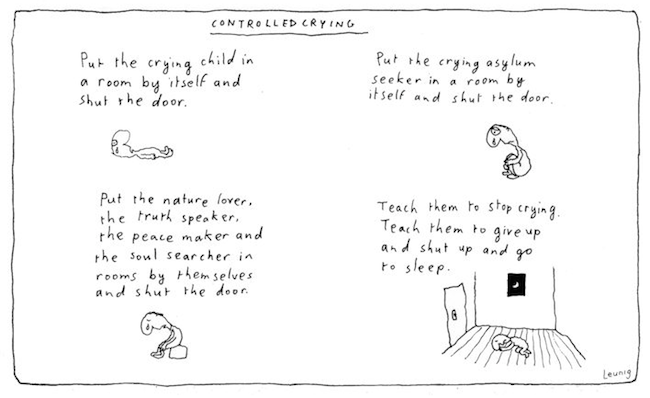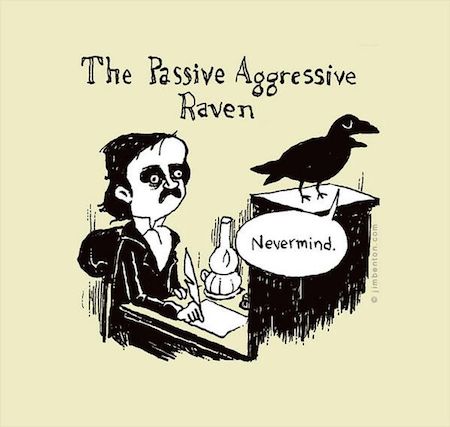(I suppose I should start calling this “Links of the Quarter” since that’s about how often I’ve been posting it.)
another gem from the incomparable michael leunig; thanks to generation alpha (check out their new blog!) for the link.
Charles Eisenstein’s book Sacred Economics is on my Save the World reading list not because I think his vision of transition to a new economy is achievable but because I think it’s practical, articulate, moving and worth striving for even if we’re not very successful at it. His new book The More Beautiful World Our Hearts Know is Possible, is, to me, everything Charles himself feared it was: “tedious, obvious, sophomoric, and unoriginal.” But that’s fine; humanists seem to really like it, and if it helps them cope with what’s ahead, it was worth writing. We’re going to need everyone: the deep green activists, the humanists, the transitioners, the communitarians, and the existentialists, to guide us through civilization’s slow collapse together and, if our species escapes extinction because of what we’ve done to this planet, to co-create working models of how a much smaller number of us might live in the world that’s left.
Since I published my “New Political Map” many of the people I call “humanists” seem to have shifted from solidly salvationist to the bet-hedging middle ground (partly “if we all work together we can…” salvationist, partly “we need a Plan B if that fails” collapsnik) that was until recently occupied by the transitioners. And at the same time many of the people I would call “transitioners” have moved off the fence and clearly onto the collapsnik (focused on “resilience building” rather than “powerdown”) side of the map (while staying at its most optimistic edge). Both groups seem to be suffering a bit of a crisis of confidence as the news gets worse (mostly about runaway climate change; most people still seem pretty clueless about the fragility of our economic and energy systems). I think this shift is encouraging.
Even more encouraging to me is the openness of transitioners and humanists to doubt and existential self-questioning. Charles quotes a critic who told him “You are speaking to audiences that are addicted to the emotional high called ‘inspiration.’ But then they go back to their sorry, complicit lives, and nothing has changed. You are actually enabling them to continue doing that.” The critic is right, and Charles’ willingness to acknowledge that he might be exhibits precisely the degree of ambivalence, humility and openness to shift that will serve us all well in the decades ahead. And a lot of those ‘complicit inspiration-lovers’ are increasingly self-aware and disturbed about this propensity.
As much as those on the salvationist side of the map (the collapse deniers, rapturists, globalists, technotopians and integrals) retrench into their separate echo chambers as the situation worsens, their ideological intransigence and unwillingness to entertain different possibilities is likely to be their undoing, and it will create an extra burden on the rest of us when ‘their’ world falls apart. So we collapsniks are going to have to stick together, and get along with each other, to take up the slack.
Our capacity to embrace the value and credibility of the worldviews of all five “collapse may now be inevitable” camps — humanist, transitionist, communitarian, ‘deep green’ radical activist and existentialist — and to love each other, can give us the resilience to adapt to new information, situations and possibilities as they emerge. Humanists are, I think, the largest of these five camps, and their capacity to shift from “how do we create a better more sustainable civilization” to “how do we minimize suffering and stay mutually supportive through civilization’s collapse” will be essential to the health of our collective response to the crises ahead.
I sense they’re making that shift; perhaps Charles’ next book will signal it.
________________
PREPARING FOR CIVILIZATION’S COLLAPSE
scott adams’ dilbert; thanks to generation alpha for the link
Are Humans Inherently Civilized?: Great two-part musing by my friend Keith Farnish about whether humans are doomed to repeat the catastrophic experiment of civilization over and over, just because of who we are (large-brained, capable of imagining terrible things, deluded to perceive ourselves as individuals, equipped with opposable thumbs etc.) In a related post, George Monbiot (thanks to Tim Bennett for the link) reviews archeological evidence that suggests large scale extinction has always been the immediate result of human migration wherever we have moved since the invention of the arrowhead, and that, perhaps, we are inherently “a destroyer of worlds” and have hence had to “civilize” ourselves to survive in the natural poverty our rapaciousness has created.
Collapse of Complex Systems is Normal: Complexity theorist David Korowicz explains the inevitability of collapse of complex systems, and why striving for a steady-state economy is admirable but achieving it is impossible. Thanks to Paul Heft for the link. Excerpt from Part Two of the article on the futility of anger in the face of inequality and corruption:
The large-scale predicament and the emergent socio-economic stresses that we are beginning to experience have very little to with fraud, corruption and the greed of a tiny few. It has a lot to do with our human civilization running into limits. As socio-economic stress deepens and uncertainty rises we can expect anger spreading in severity and scale in the coming years. Uncomprehending rage turned outwards and inwards, fantasies of catharsis through revolution, extremism and authoritarianism, aggressive power/productive asset accumulation and scapegoating are just some of destructive behaviors we’re likely to see. The stakes involved in such transitions mean that it’s important to interrogate our anger, and question its foundations. That’s why I’d argue that in the rich part of the world there has been a huge amount of self-righteous finger-pointing that is not only delusional but may well be detrimental to how we deal with the collective challenges ahead. None of this means, for example, that fairness and inequality (especially in-group) are not hugely (and innately) important for people, and that societies who fail to engage with it in the difficult years ahead are greatly adding to the risk of catastrophic social fractures that will do nobody any good…
As societies face increasing challenges in the years ahead, and governments and international institutions fail to hold together our web of expectations, we can expect a lot more anger and more people feeding it. Some form of dis-orderly economic contraction is almost certain and nothing will change that… In fact we know very little about how a society might practically and dynamically furnish large and bewildered populations with the basics of food, healthcare, critical services, security and governance in the context of a complex society falling apart.
Another Model Predicts Resource/Economic Collapse: For some reason a small NASA study from last year, simulating the economic activities of “elites” and “commoners” tied into population and resource availability data, and predicting inevitable collapse, has received a huge amount of press. It’s a pretty simplistic model, but it’s good to see mainstream media starting to wake up to the impending collapse of our economic and energy/resource systems; maybe soon they’ll see the connection to runaway climate change and we’ll actually have a broad debate about large system (un)sustainability, and scenarios (and preparations) for collapse. Thanks to the many that pointed me to the original study and the articles about it.
Everything is Broken: An interesting essay by young hacker-journalist Quinn Norton about how “computers are broken” due to their unmanageable complicatedness and massive vulnerabilities, “people, as well, are broken” and “in the end, it’s culture that’s broken“. Very techie, savvy enough to perceive that in the end we humans are just collections of “gray matter with a god complex”. Thanks to Raffi Aftandelian for the link.
Resilient Health Care: A chapter in a new collection on resilience called Communities That Abide, edited by Dmitry Orlov, is about resilient health care. Written by Canadian doctor James Truong, it focuses on the primary importance of developing and drawing on community lay skills, on prevention, and on community-consultative self-diagnosis and self-management. It also advises what tools and basic skills to have/develop in your community, and what, if all else fails, will need expert treatment. And it talks soberly about mindset — the acknowledgement that often our craving for maximum health and longevity at any cost is irrational and self-defeating.
The Wisdom of Local Solar: An excellent article by Eerik Wissenz on the value of creating self-replicating community-based solar energy capacity. Thanks to Paul Heft for the link. [But as Albert Bates has explained, this technology doesn’t scale; technophiles take note]. Excerpt:
Solar concentrators are a technology that can make a sustainable local economy possible. Other important parts of this technology suite include: Permaculture, forestry and forest gardening, aquaculture and water management, making shelter and clothes out of locally sourced materials. [We also need] water and heat to cook and preserve food, food and energy to transport and build things, thermal and mechanical energy to transform materials, and a heat source to maintain comfortable temperatures…
A much better plan [than relying on centralized energy production] is to provide the plans and the know-how to build and maintain solar concentrators out of locally sourced materials, with the energy supplied by these same solar concentrators, training local people to build and maintain solar concentrators in the process. The question then becomes one of bootstrapping a solar concentrator self-replicating process, standing back and watching it run.
A Culture of Fear: Permaculturalist Tobe Hemenway explains how fear and coercion are essential to keeping people “civilized”. Excerpt:
To what state have we declined when only the revocable permission of the powerful can guarantee our basics? We gave up a staggering number of freedoms to have our food source guaranteed. Why would anyone trade their freedom for poor health and a life of slavery? I’ve come to doubt that people became farmers voluntarily, and there are many recent examples of hunter-gatherer groups who took one look at farmers, saw what the trade entailed, and said no thanks… Foraging peoples are almost always converted into farmers by a combination of terror, coercion and the extinction of even the memory of an alternative.
The Collapsnik Register: Recent article by Craig Comstock in HuffPost lists many of the best writers about civilization’s collapse; I’m honoured to be included in the list.
Rob Hopkins Interviews Paul Kingsnorth: In case you still haven’t seen/heard it, here’s the interview the founder of Transition did with the co-founder of Dark Mountain.
________________
LIVING BETTER
cartoon by jim benton
Ten Ways to Show Love to Someone With Depression: Good to see this list, and especially what’s not on it. Takes courage to do these things, but it is what they need. Thanks to Tris Hussey for the link.
Parked: Fascinating and lovely short film by a Bowen friend Sylvaine Zimmermann about the homeless men who live in Vancouver’s Stanley Park.
Thinking Like a Creek: On one level this article is about simple, thoughtful methods for stream restoration and natural habitat preservation. But on another it’s about appreciating the way complex systems really work. Like our human body, like communities, like organizations and like larger-scale ecosystems, creeks function by workarounds. They “know” what needs to be done, and, despite interventions trying to prevent them, they’ll find the easiest way to do it. Thanks to Tree for the link.
Artists and Climate Change: Chantal Bilodeau’s blog about the important role artists have in communicating about climate change and the importance of place.
Cli-Fi Books: Mary Woodbury’s listing of novels about life in the future with a radically altered climate. Alas, almost all are dystopias. Thanks to Janaia and Alex Smith for the link.
The Gift Economy and the Art of Asking: Amanda Palmer explains why the Gift Economy (the most altruistic and least commercial edge of the Sharing Economy) is gaining strength, and some ways to help it bloom. Thanks to Tree for the link.
The Best Diet: Another research study shows that the best diet is a variety of real (unprocessed, un-chemically polluted, un-factory farmed) food. And that no specific diet is “best” for everyone. So stop reading about what you “should” eat (and otherwise ingest) and stop listening to self-styled “experts”, and start observing and managing your own health. Thanks to Meribeth Deen for the link.
A New Kind of “Mobile” Home: Riffing off the exploding tiny homes movement, there are now some very innovative, affordable, attractive and portable homes that, while designed for refugees, could allow any and all of us to live self-sufficiently and comfortably, even during a Great Migration. Thanks to Beth Patterson for the link.
An App That Triples Your Reading Speed: A simple tool that mimics and optimizes the way our eyes and brain process words can be used to triple your reading speed almost instantly while increasing comprehension. Try it out. Thanks to Nathaniel James for the link.
What Collapse Can Inspire: I’ve often said that if we want to know how to prepare for collapse, we should look at places where it’s already happened. Last year Jackson MS elected the late Chokwe Lumumba, a long-time radical, its mayor, and while his son failed to get the nod to succeed him this year, Jackson had already launched and is continuing to pursue a broad movement to create worker-owned co-ops to address its poverty and unemployment (and other) problems. Worth keeping an eye on. Thanks to Raffi Aftandelian for the link.
Iran’s Astonishing Birth Rate Decline: Alan Weisman explains how change really happens, describing how Iran’s fertility rate went from being the highest in recorded human history to below replacement level in a few short years. It was done on horseback, and with the gruelling work of visiting every small community in the country and speaking with millions of locals (women especially) face to face, and giving them the capacity and resources to make decisions for themselves.
________________
POLITICS AND ECONOMICS AS USUAL
protest sign in kansas, via sandy griffin
The Disappearance of the Middle Class: It’s most noticeable in the US so far, but is occurring everywhere there is a middle class. The median US family income is now just above the poverty line, meaning that about half of Americans are “poor” or nearly so. And even these dismal numbers are terrible lies: If true rates of inflation were used, rather than the doctored “official” ones, you’d see the hollowing out much more broadly and deeply. What’s worse, the median net worth of Americans (value of assets less value of debts) is about zero, so that means that the veneer of “wealth” of the lower-middle to upper-middle classes in the US is illusory — if/when they cannot pay those debts back, all of their assets will have to be liquidated to pay off the balance. Half of America is that close to living on the streets.
Canada: “A Rogue, Reckless Petrostate”: Marianne Lenabat explains how Canada’s fall from being one of the most progressive nations on the planet to one of the most heartless and destructive has been carefully wrought by an exploitative conservative minority against the will and without the consent of the large majority of Canadians, and what their ability to do that means for our political system. Thanks to Eric Lilius for the link. Former Canadian budget officer Kevin Page chimes in with an insiders view of what’s “grotesquely wrong”.
The Secrets of Food Marketing: An actress impersonates a food marketer, but the facts she tells the astonished audience are the unvarnished truth. Hint: It’s all about not wanting to know. Thanks to Lisa Marie Whitaker for the link.
________________
FUN AND INSPIRATION
grammar pirates from scott clark; sent to me by several english majors
Murmuration: Video of hundreds of thousands of starlings “deciding” precisely where to roost for the night. Thanks to Beth Patterson for the link.
Those Dudes Were Really Chill: See what classical sculptures look like when dressed in modern clothes. Thanks to Iris Carr for the link.
Humans Have Covered the Globe Longer Than We Thought: Simplistic anthropologists would like us to believe that we migrated slowly and opportunistically from proto-human African settlements to the rest of the planet, but evidence keeps confounding them. Recently, we learned that aboriginal Australian cave art dates back 100,000 years, and now we’ve found 22,000 year old rock art in Brazil.
Sexy Naked Women Everywhere: Kate Fridkis describes how the advertising and entertainment media’s depiction of women demeans us all and entrenches the patriarchy.
Sixty Years of the Most Common US Names for Baby Girls: Fascinating map shows the trends year by year.
How the 2008 Recession Reshaped the US Economy: 255 charts show how job numbers have changed in 255 industry sectors over the past decade. The sectors are also ranked by average salary.
What America Cares About Now: A graphic that shows Upworthy’s page hits over the past year by subject. The bad news is that economic collapse (or even unemployment), resource exhaustion and runaway climate change are pretty much not even on the list. The good news is that what is on the list are things people feel that we (collectively or individually) have some agency over. Not that Upworthy, which shuns celebrity news, is a representative arbiter of most humans’ preoccupations.
Whole Foods: Wonderful People, Awful Customers: A customer tries to understand what Whole Foods customers are so chronically angry about. Thanks to Colleen Wainwright for the link.
Fifty Shades of Awful Writing: The delightful Dave Barry explains the “women’s porn” hit and takes brilliant potshots at its dreadful prose.
Etegami: I’ve often wanted to be able to write smart short sayings and illustrate them graphically the way Hugh Macleod does. Now Nancy White tells us about Etegami, a way to do just that.
AniMusic: Great Music. Brilliant Animation. Thanks to Cheryl Long for the links.
Ice Tsunami: A rare but astonishing natural event when thawing ice is pushed up from the shoreline to the homes nearby, and advances at a startling rate, in some cases engulfing or destroying buildings in its path. Thanks to Ryan Stones for the link.
Things Are a Little Different in Canada: Some things you’ll only see in the Great White North.
________________
THOUGHTS FOR THE MONTH
Conversation between Gail Tverberg and John Michael Greer,via Albert Bates (thanks to Eric Lilius for the link):
Gail: “Nature abhors a vacuum and nature also abhors energy that has not been dissipated. And one of those things that dissipates energy extremely well is civilization… It is as though [in trying to ‘fix’ civilization] you are trying to fight a hurricane. “
John: “A hurricane is a dissipative system, but it has properties like tending to maintain itself, and behaving according to its own internal dynamics, and there is not much you can do to it to disrupt that process until it runs through to its conclusion. [So] civilization is like a slow hurricane. And once it gets started, it is going to go through a certain swath of destruction until it finally peters out. There has actually been quite a lot of work along the same lines with regard to civilizations. [Toynbee and Spengler argue] that civilizations have a predictable life cycle, as a hurricane does.”
From Laura Burns: “Myth puts us in our place.”
From Dmitry Orlov:
In case you missed it, the US is not a democracy. A Princeton University study by Gilens and Page performed a regression analysis on over a thousand public policy decisions, and determined that the effect of public opinion on public policy is nil. That’s right, nil. It doesn’t matter how you vote, it doesn’t affect the outcome in any measurable way. By extension, that also goes for protesting, organizing, dousing yourself with gasoline and setting yourself on fire on the steps of the US Senate, or whatever else you may get up to. It won’t influence those in power worth a damn…
So, what is it that you do when, on election day, you proudly march into the voting booth and pull a lever, or touch the touchscreen of a voting machine? You are certainly not making a decision; that’s been proven already. But you are still doing something: you are voting in support of your owners—the ones who make public policy decisions on your behalf. If you vote, then it must be because you approve of what they are doing. And what is it that they are doing? Well, job one for them seems to be to make sure that the rich continue to get richer while the poor get poorer and the middle class is… well… class dismissed. If this sort of public policy seems self-destructive to you, that’s probably because it is.
From PS Pirro, writing about the leftover pieces of lost love. There is too little about love, and its importance and fragility, on my blog, so this is my feeble attempt to compensate.
CHERRY SYRUP
I have a few things of yours,
dusty in the bottom of a drawer
I haven’t opened in years,
rags and bits of old news,
a birthday card from your mother,
tacky with the spillage from a small
plastic bottle of cherry body syrup
you brought home one night
to pour across my skin, vivid
like movie blood, sticky as
everything we were to become,
even after all this time it remains
as it was in the beginning,
content in search of contour,
cloying on the tongue, unable
even at the most earnest bidding
of love and time to become solid.
From Timothy Leary: “Find the others”.










Damn you Dave! So much more reading to do.
In all seriousness, great links as always. And appreciate linking the Generation Alpha blog ready to start posting soon. http://www.GenerationAlpha.org for those that missed it.
Haha, I’ll second that Ben! Good thing today’s a public holiday, so I gave myself half the day off work. Now to get stuck into some of those links!
And I’ll start tapping out my contribution to the Generation Alpha blog… :-)